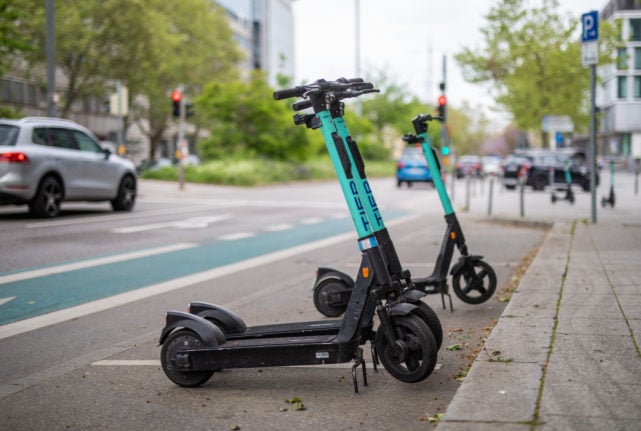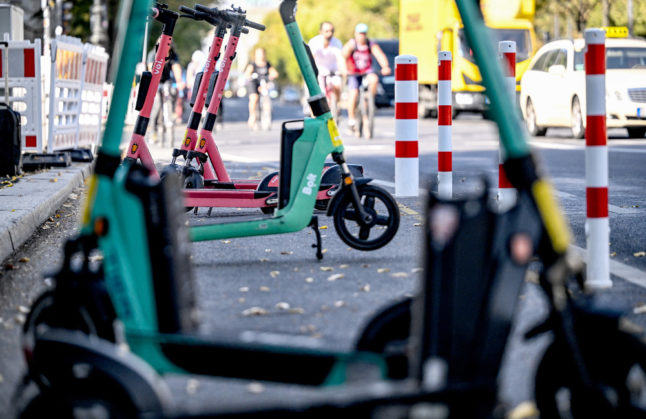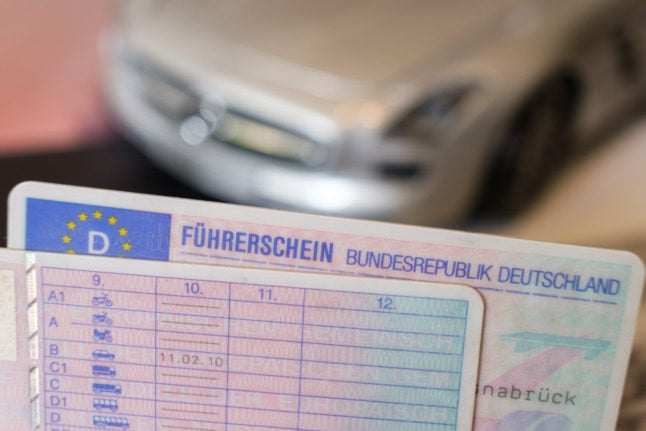According to a YouGov survey commissioned by the German Press Agency (DPA), only 37 percent of people in Germany want e-scooter rentals to remain allowed in German cities, while a further 44 percent were in favour of a full-on ban. Nineteen percent declined to give an opinion.
Most of the respondents (71 percent) said they’d never tested out an e-scooter themselves while 12 percent only had once.
The controversial scooters, available to rent in most German cities to anyone over the age of 14, don’t require a special license to operate.
Since 2020, accidents involving their use have increased fivefold, leading police and safety organisations to call for a crackdown on how they’re used.
READ ALSO: Could Germany ban e-scooters following rise in accidents?
This could explain why an additional 61 percent of those surveyed think that road safety has worsened since e-scooters were approved for use on German roads in 2019.
An additional 76 percent of respondents also think that e-scooters should be parked in specially designated parking spaces. Thirteen percent were in favour of the roadside and twelve percent of the pavement as a Stellplatz, or parking place.
The representative survey, which took place between September 2nd to 4th, had a total of 2,004 participants over the age of 18.

Concerns over safety
Even in cities such as Stuttgart and Berlin, which have specially designated areas to park E-scooters, the vehicles often end up scattered on sidewalks – with consequences.
“Older people have massive problems, and more often falls occur due to incorrectly parked E-scooters,” Jens-Peter Kruse from the Federal Association of Senior Citizens’ Organisations told DPA.
“In some cases, the e-scooters have been parked in such a way that it is downright provocative – across the cycle path, across the footpath,” Kruse added.
“This is a very big danger for people with impaired vision, but also for all people who use this cycle path in the dark.”
The German Association for the Blind and Visually Impaired has filed lawsuits in Bremen, Münster and Berlin “to enforce fixed parking spaces on pavements,” deputy executive director Christiane Möller told DPA.
“There have been many accidents involving blind and visually impaired people and some no longer dare to go out on the street alone because of the fear of falling over scooters lying around. This is no longer acceptable.”
In 2022 there were a total of 442 road accidents, up from 282 in 2021, according to Germany’s Statistical Office.
In 69.7 percent of the cases, the e-scooter drivers themselves were found to have caused the accidents.
Yet in places where authorities have worked to organise the street, “the situation has improved, at least in the inner city area”, Möller said.
Kruse from the Federal Working Group of Senior Citizens’ Organisations also called for fixed parking areas: “We must limit this uncontrolled growth immediately.”
The Association of Towns and Municipalities considers these “a promising way, especially in dense inner city areas”.
The control of parked vehicles without these parking zones is “only feasible with a lot of effort”.
However, according to the experts, only the e-scooters of rental companies are affected. Owners would treat their own vehicles with more care, and park them correctly.
This anger over rentable e-scooters already led to their ban in Paris: There, the rental business ended as of September 2022, after 89 percent of those involved opposed it in a citizens’ survey.
But the Federal Working Group of Senior Citizens’ Organisations and the Association of Towns and Municipalities (DStGB) do not see a ban as a solution.
“The municipalities in Germany are not seeking a legal ban on e-scooters,” says the DStGB. “Something like this should only ever be a last resort. The focus should be on local solutions such as getting the vehicles insured and registered, and possibly requiring special licenses for those who drive them.”
According to the German Insurance Association (GDV), 764,000 e-scooters were registered in 2022.
Germany is currently the world’s second-largest market for e-scooter rental after the US. The vehicles can travel at speeds of up to 20 kilometres per hour.
READ ALSO: EXPLAINED: The rules for riding an e-scooter in Germany



 Please whitelist us to continue reading.
Please whitelist us to continue reading.
Member comments